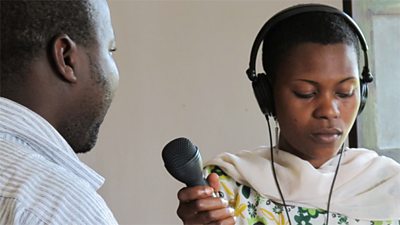Downloads
Publication date: July 2012
Summary
- In Tanzania, ����ý Media Action works with the ����ý Swahili service and local partner stations to produce programmes that bring leaders and citizens together to talk about governance issues.
- Project station partners see the potential of radio to serve as a round-table for discussions between policy makers and affected communities. However, many station partners felt that policy makers currently talk at citizens rather than engage in a dialogue as they are reluctant to be asked questions.
- ����ý Media Action has focused on featuring citizens’ voices in national and local radio programmes and is working towards citizens being able to question the decisions of their leaders.
- During pre-testing of the ����ý Media Action branded Haba Na Haba programme, audiences said that the programme talked about issues which affected them and put across real voices from their communities.
Context
Tanzania is one of the most politically stable countries in Africa. Radio is the predominant media and there are dozens of private FM stations, with many broadcasting news from international media. However, the ruling Chama Cha Mapinduzi (CCM) party dominates Tanzanian politics and there is a culture of not questioning or criticising the state. In March 2011, ����ý Media Action’s partnership with the state broadcaster Tanzania Broadcasting Corporation (TBC) was terminated amid speculation that the CCM party had not appreciated the coverage TBC had given to the opposition party Chadema during the 2010 elections.
The project
The project in Tanzania is part of the ����ý Media Action A National Conversation project. Funded by the DFID Governance Transparency Fund, A National Conversation operates in Angola, Sierra Leone and Tanzania and aims to increase government transparency, accountability and public participation by way of the broadcast media. Since 2011, ����ý Media Action has worked with the ����ý Swahili service in Tanzania to produce the national radio discussion programme Haba Na Haba (Little By Little) and with six local partner radio stations to build capacity and programming at the local level.
Methodology
In 2011-2012 we conducted research with audiences through a survey in eight broadcasting areas and panel discussions. In-depth interviews were conducted with partner station staff. All research aimed to explore how media serves as a driver of domestic or institutional accountability and how the provision of platforms that provide information enable individuals, groups, communities and societies to make more informed choices and hold government and other decision makers to account.
Findings
While Tanzania is a stable society, participants felt that there is a lack of dialogue between officials and citizens. In interviews, many station managers commented that often leaders talk at the citizens, providing citizens with little or no opportunity to make their views known to their leaders or ask questions of them. This reflects a general reticence within Tanzanian culture to publicly question or criticise. Many of those working at the local stations thought leaders do not want to be questioned for fear they will be embarrassed.
However, audiences expressed a desire for programming that addresses issues that affect people like them. In pre-testing groups for the Haba Na Haba radio discussion programme, many said they liked the programme for having real voices from different regions in Tanzania and for talking about issues relating to public services delivery.
"I was touched when that old lady talked of the challenges she goes through and it is very true that most people get tired but still you have to go fetch water, cook and do everything while the men just sit down and wait." - Listening group participant
After the broadcast of the third episode of Haba Na Haba the programme received 120 messages from the public, many of which asked for the government to address infrastructure or public service delivery problems. This suggests that, despite a culture of public acquiescence, Tanzanians are eager for a more transparent and accountable government, and to participate in a state-citizen dialogue.
����ý Media Action is working to build the capacity of local partner stations to provide such programming and opportunities for citizens to participate in governance discussions. Trainers have focused on teaching station staff editorial and production skills. This has included a course on package making, which enables producers to broadcast the voices of ordinary people during the programme. Station staff reported an increase in confidence about making objective programming that acts as a round-table for a discussion among all interested parties.
Implications
Audiences want accountable, transparent government and opportunities to participate in a state-citizen dialogue. At the same time, politicians are reluctant to participate in programming they feel will potentially embarrass them with delicate or aggressive questions. Programming should focus on addressing issues of concern to ordinary citizens and incorporating real voices from the communities. As far as possible, programmers should aim to bring in politicians to speak around issues of governance but will need to assure politicians that the aim of the programmes is not to embarrass leaders but to bring them closer to their citizens.
